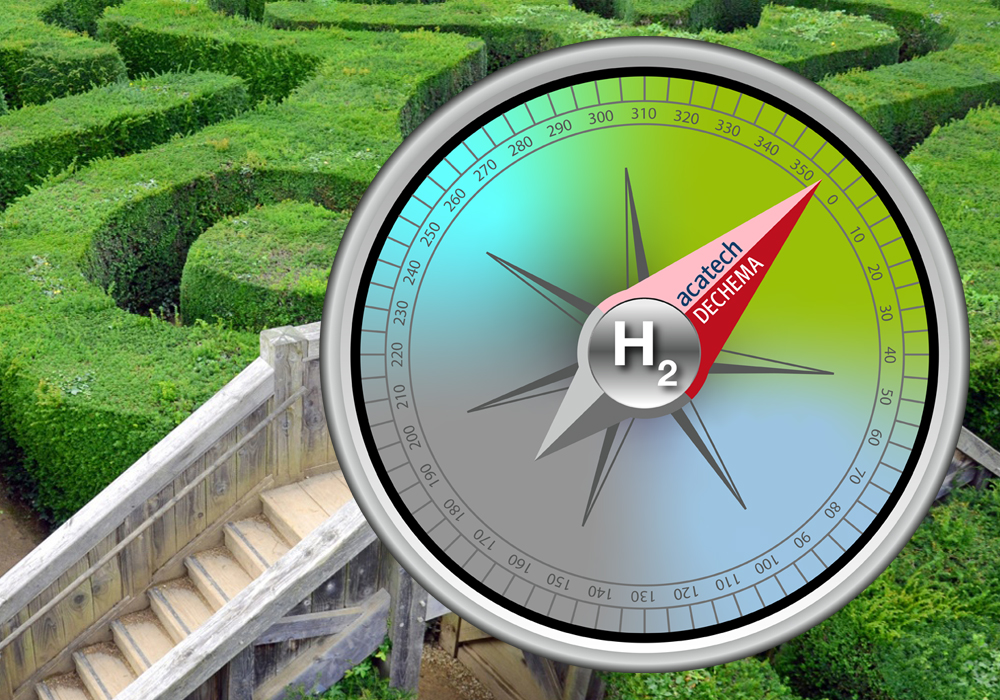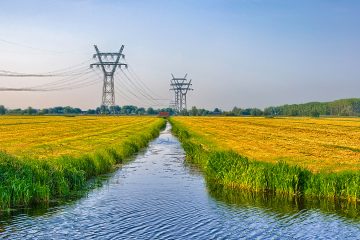A key phase for the successful ramp-up of the hydrogen market

Berlin, 27 April 2022
How do science, industry, NGOs and the public administration think that a successful ramp-up of the hydrogen market can be accomplished? Today sees the publication of the full report on a survey about hydrogen technologies in Germany by acatech – National Academy of Science and Engineering and DECHEMA (the Society for Chemical Engineering and Biotechnology). Some 600 representatives of science, industry, the public administration and civil society took part in the survey, which was carried out in autumn 2021.
Representatives of science, industry, NGOs and the public administration expect very rapid growth in the market for climate-neutral hydrogen (H2). This is one of the findings of a survey (“Wasserstoffwirtschaft 2030/2050: Ziele und Wege”) carried out by acatech and DECHEMA among just under 600 representatives of science, industry, NGOs and the public administration. The people who took part in the survey expect that, by 2030, around half of the hydrogen used in Germany will be climate-neutral and a further 31% will be low-carbon. The respondents also predict that, by this time, less than a quarter of Germany’s hydrogen will still be produced using conventional methods. “People have huge expectations of hydrogen technologies”, concludes acatech President Prof. Dr.-Ing. Jan Wörner. “It is clear that they think hydrogen will play a major role in tackling climate change and powering German industry. In order to meet these high expectations, we need an effective hydrogen roadmap that sets out a clear direction and allows for a flexible mix of instruments.”
Full survey report expands on short version published in March 2022
Today sees the publication of the full report on the survey, which was carried out as part of the Wasserstoff-Kompass project, a collaboration between acatech and DECHEMA. In March 2022, the project partners had already published some of the survey’s findings about the drivers of and barriers to a hydrogen market ramp-up, networking, professional development and promoting acceptance of the technology. As well as revisiting these previously published results, the full survey report published today also presents the rest of the survey’s findings. These describe the respondents’ expectations about the future production and use of hydrogen, the need for imports and the establishment of the necessary infrastructure.
Hydrogen expected to play important role in powering industry and tackling climate change
The people who took part in the survey expect the ramp-up of the hydrogen market to deliver several benefits, chief among them the prospect of hydrogen helping to reduce greenhouse gas emissions. According to those surveyed, the second most important opportunity associated with hydrogen is the production and export of electrolysers. The development of new research fields, the production and export of H2-based end applications and a socially acceptable transformation of the energy system were also rated as important opportunities by over a quarter of respondents. “It is clear that most of those who took part in the survey are already aware of the benefits of hydrogen technologies”, says Dr. Klaus Schäfer, Chairman of the Board of DECHEMA. “If these opportunities are to be realised, we must immediately start planning long-term measures to support the production and use of hydrogen.”
About the Wasserstoff-Kompass project
Since June 2021, acatech and DECHEMA have been collaborating on the two-year Wassserstoff-Kompass project to jointly develop the basis for the German government’s national hydrogen roadmap. A meta-analysis is being carried out to enable the evidence-based, technology-neutral identification of sectoral needs and an analysis of domestic production capacity. The Wasserstoff-Kompass project is also engaging in a dialogue with stakeholders from science, industry, government and civil society in order to capture their views and work towards a common vision of a German hydrogen economy. The results from both parts of the project are being used to formulate different pathways and policy options for accomplishing a market ramp-up and identify their respective pros and cons. The Wasserstoff-Kompass project is funded by the Federal Ministry of Education and Research and the Federal Ministry for Economic Affairs and Climate Action.
The full survey report as well as the short version of the survey report are available here.



